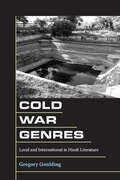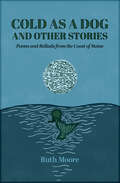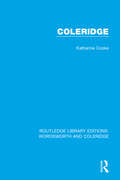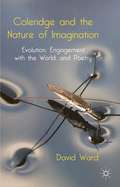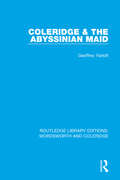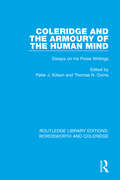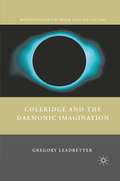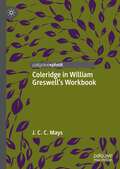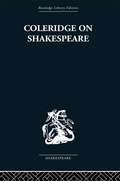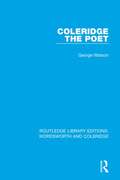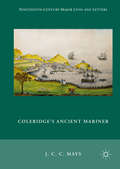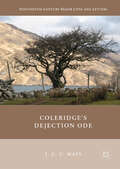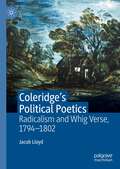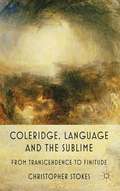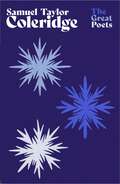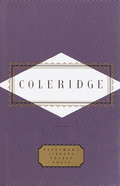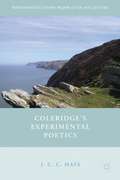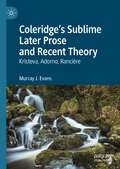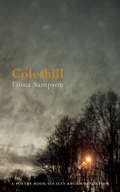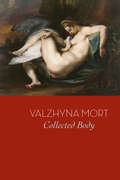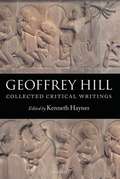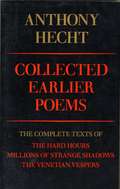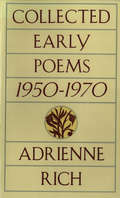- Table View
- List View
Cold War Genres: Local and International in Hindi Literature
by Gregory GouldingCold War Genres explores post-independence Hindi literature, framing it within the sociopolitical backdrop of Nehruvian India during the early Cold War. The book underscores the pivotal role of Hindi's claims to be a national language following independence, which fostered a unique moment of literary innovation. Central to its narrative is the work of Gajanan Madhav Muktibodh, a pivotal figure in modern South Asian literature. Using Muktibodh's poetry, criticism, and fiction as a primary example, the book shows how literary form shapes a response to the internal contradictions of 1950s India, one that must be read in light of both the antinomies of Hindi literature and North India as well as the aesthetic debates and emerging ideas of global space during this time. Cold War Genres therefore functions as a lens to evaluate questions of genre and form shared by a range of literary cultures in the mid-twentieth-century decolonizing world. This book features extensive translations from Muktibodh's poetry and prose, including full translations of two poems "Brahmarākṣas" (The Brahman Demon) and "Aṃdhere meṃ" (In the Dark).
Cold as a Dog and Other Stories: Poems and Ballads from the Coast of Maine
by Ruth MooreBestselling author Ruth Moore (1903-1989) not only wrote some of Maine’s greatest novels, but was also a talented poet who published three books of poetry and wrote ballads that have become an ingrained part of pop culture along the coast. Her “The Night Charlie Tended Weir” is frequently performed in theaters and at clambakes. Folksinger Gordon Bok recorded an album based on her ballads. Cold as a Dog and Other Stories is a collection of work from a career that stretches for decades and serves to highlight and showcase the remarkable breadth of her writing talent. The book includes selections of ballads, poems, and short stories that previously appeared in Cold as a Dog and the Wind Northeast, The Tired Apple Tree, Time's Web, and When Foley Craddock Tore Off My Grandfather's Thumb.
Coleridge (RLE: Wordsworth and Coleridge #3)
by Katharine CookeFirst published in 1979, this book provides thorough a guide through Coleridge’s diverse body of work, looking not just his poetry but also his literary criticism and theories, plays, political journalism and theory, and writings on religion and philosophy. The author is careful to avoid emphasising one aspect of his work over another and consequently the whole emerges as a richer, more complete body of thought — less esoteric and more concerned with the world. It challenges the notion of the ‘damaged archangel’, showing he was a successful playwright, long-standing contributor to one of the foremost papers of the day and a literary figure of note in touch with leading thinkers and writers.
Coleridge And The Nature Of Imagination
by David WardExamining a range of Coleridge's writings, this book uses recent scientific research to understand how we have evolved to make mental representations of the counterfactual, how such transformative essays in Imagination have enabled humans to survive, to prosper and to express themselves in the sciences, the arts and particularly in poetry.
Coleridge and the Abyssinian Maid (RLE: Wordsworth and Coleridge #14)
by Geoffrey YarlottFirst published in 1967, this book seeks to show the causes which led to Coleridge’s breakdown in 1802 and to indicate how his views on poetry changed as a result of it. The approach is selective in that it only focuses on one part of Coleridge’s life (roughly 1793-1810); however the author attempts to relate a number of different areas of his activity and to trace his emotional and moral development more closely than might be possible in a full-scale biography. The account of Coleridge’s life ends in 1810, when his relationship with the two key figures in his life Asra and Wordsworth had ruptured, as this reflected which of Coleridge’s Notebooks were available at the time.
Coleridge and the Armoury of the Human Mind: Essays on his Prose Writings (RLE: Wordsworth and Coleridge #7)
by Thomas N. Corns Peter J. KitsonFirst published in 1991, this book collects a broad array of path-finding scholarship by specialists in Coleridge and Romantic literature on the subject of his prose. They range from broad appraisals of Coleridge’s own critical practises; demonstrations of the fecundity of his autobiography, the Biographia Literaria, for contemporaries; the effect of Milton and the radical polemicists of the English Civil War on Coleridge’s early political and religious dissent; and the influence of the Hebrew prophetic tradition in his move away from the conjectural millenarianism of his youth towards the interpretation of Prophecy and a symbolic narrative.
Coleridge and the Daemonic Imagination (Nineteenth-Century Major Lives and Letters)
by Gregory LeadbetterThrough politics, religion and his relationship with Wordsworth, the book builds to a new interpretation of the poems where Coleridge's daemonic imagination produces its myths: The Ancient Mariner, Kubla Khan and Christabel . Re-reading the origins of Romanticism, Leadbetter reveals a Coleridge at once more familiar and more strange.
Coleridge and the Philosophy of Poetic Form
by Ewan James JonesEwan James Jones argues that Coleridge engaged most significantly with philosophy not through systematic argument, but in verse. Jones carries this argument through a series of sustained close readings, both of canonical texts such as Christabel and The Rime of the Ancient Mariner, and also of less familiar verse, such as Limbo. Such work shows that the essential elements of poetic expression - a poem's metre, rhythm, rhyme and other such formal features - enabled Coleridge to think in an original and distinctive manner, which his systematic philosophy impeded. Attentiveness to such formal features, which has for some time been overlooked in Coleridge scholarship, permits a rethinking of the relationship between eighteenth-century verse and philosophy more broadly, as it engages with issues including affect, materiality and self-identity. Coleridge's poetic thinking, Jones argues, both consolidates and radicalises the current literary critical rediscovery of form.
Coleridge in William Greswell’s Workbook
by J. C. MaysThis book provides a critical and biographical account of the fascinating hand-made book of rector William Greswell (1848-1923), in which he assembled British and American reviews and accounts of the Romantic poet, critic, philosopher, and religious thinker Samuel Taylor Coleridge (1772-1834). J.C.C. Mays re-evaluates Coleridge’s nineteenth-century reputation through the lens provided by Greswell’s workbook. Mays demonstrates how Coleridge is one of the most complicated and influential religious thinkers of the nineteenth century, whose “religious musings” (most prominently as published in Aids to Reflection and On the Constitution of the Church and State, but also in posthumous collections such as Confessions of an Inquiring Spirit) cast a long shadow over religious thinking in nineteenth-century England and America. Although Greswell was but one of Coleridge’s many readers in the nineteenth century, his engagement with Coleridge’s writings was noteworthy for the sheer mass of the materials he assembled, and the breadth of the Coleridge he depicts. Greswell’s Coleridge is a Coleridge in whom all Coleridgeans will be interested.
Coleridge on Shakespeare: The text of the lectures of 1811-12 (Monographs)
by R. A. FoakesFirst published in 1971. The only substantial text of a series of lectures on Shakespeare by S T Coleridge is that provided by J P Collier's Seven Lectures on Shakespeare and Milton (1856). His text of these important lectures given by Coleridge in 1811-12 has been the basis of all modern editions. This edition is based on hitherto unpublished transcripts of the lectures made by Collier when, as a young man, he attended Coleridge's lectures. R A Foakes' introduction and appendices demonstrate the extent to which Collier revised and altered Coleridge's words for the edition he published forty-five years later. This volume therefore provides a much more authoritative text of Coleridge's most important Shakespeare lectures.
Coleridge the Poet (RLE: Wordsworth and Coleridge #11)
by George WatsonFirst published in 1966. Despite the intense interest in Coleridge in the twentieth century, this book represents the first study of Coleridge’s poetry to be published in Britain. It is also the first to be based upon the conclusion that Coleridge’s greatness as a poet is a matter of achievement rather than aspiration and to argue that his literary career was nearly half a century long, consisting of more than just well-known texts like The Ancient Mariner and Kubla Khan. The author argues the formality of the romantic achievement and its success in creating whole and fully realised poems in the established literary kinds.
Coleridge's Ancient Mariner (Nineteenth-Century Major Lives and Letters)
by J. C. C. MaysThis is the first book-length study to read the "Ancient Mariner" as "poetry," in Coleridge's own particular sense of the word. Coleridge's complicated relationship with the "Mariner" as an experimental poem lies in its origin as a joint project with Wordsworth. J. C. C. Mays traces the changes in the several versions published in Coleridge's lifetime and shows how Wordsworth's troubled reaction to the poem influenced its subsequent interpretation. This is also the first book to situate the "Mariner" in the context of the entirety of Coleridge's prose and verse, now available in the Bollingen Collected edition and Notebooks; that is, not only in relation to other poems like "The Ballad of the Dark Ladiè" and "Alice du Clós," but also to ideas in his literary criticism (especially Biographia Literaria), philosophy, and theology. Using a combination of close reading and broad historical considerations, reception theory, and book history, Mays surveys the poem's continuing life in illustrated editions and educational textbooks; its passage through the vicissitudes of New Criticism and critical theory; and, in a final chapter, its surprising affinities with some experimental poems of the present time.
Coleridge's Dejection Ode (Nineteenth-Century Major Lives and Letters)
by J.C.C. MaysColeridge's Dejection Ode completes J.C.C. Mays’ analysis of Coleridge’s poetry, following Coleridge’s Ancient Mariner (Palgrave 2016) and Coleridge’s Experimental Poetics (Palgrave 2013). "Dejection: An Ode" stands alone in Coleridge's oeuvre: written at a time of personal crisis, it reaches far back and deeply into his thinking in an attempt to find a poematic solution to ideas and problems he had mulled over for a long time. Mays reveals how the poem also marks the opening of the second half of Coleridge's career as both poet and thinker. In three central chapters Mays examines the new style that evolved in the process of writing the Ode: the technical means of metrics, rhyme and grammar; language and allusion; and symbol and structure. He recounts the complex, sometimes controversial critical history of the Ode, and suggests an editorial solution to the problem created by the Letter to Sara Hutchinson; re-evaluates the position of Wordsworth in the poem apropos the political statement it makes; clarifies the distinction between the views on Imagination expressed and those contained in Biographia Literaria; and traces the links of the concept "dejection" as it underpins Coleridge's late poems.
Coleridge's Political Poetics: Radicalism and Whig Verse 1794 - 1802
by Jacob LloydThis book considers Samuel Taylor Coleridge’s engagement with ‘Whig poetry’: a tradition of verse from the eighteenth century which celebrated the political and constitutional arrangements of Britain as guaranteeing liberty. It argues that, during the 1790s, Coleridge was able to articulate radical ideas under the cover of widely accepted principles through his references to this poetry. He positioned his poetry within a mainstream discourse, even as he favoured radical social change. Jacob Lloyd argues that the poets Mark Akenside, William Lisle Bowles, and William Cowper each provided Coleridge with a kind of Whig poetics to which he responded. When these references are understood, much of Coleridge’s work which seems purely personal or imaginative gains a political dimension. In addition, Lloyd reassess Coleridge’s relationship with Thomas Percy’s Reliques of Ancient English Poetry, to provide an original, political reading of ‘The Rime of the Ancyent Marinere’. This book revises our understanding of the political and poetic development of a major poet and, in doing so, provides a new model for the origins of British Romanticism more broadly
Coleridge, Language and the Sublime
by Christopher StokesTraversing the themes of language, terror and representation, this is the first study to engage Coleridge through the sublime, showing him to have a compelling position in an ongoing conversation about finitude. Drawing on close readings of both his poetry and prose, it depicts Coleridge as a thinker of 'the limit' with contemporary force.
Coleridge: Everyman's Poetry
by Samuel Taylor ColeridgeThe best of Samuel Taylor Coleridge's poems in a beautiful new gift editionSamuel Taylor Coleridge (1772-1834) was educated at Christ's Hospital, London and Jesus College, Cambridge. Close collaboration with Wordsworth resulted in joint production of the volume Lyrical Ballads in 1798, which contained Coleridge's 'The Rime of the Ancient Mariner', signposting the Romantic movement. After wintering in Germany in 1797-8 he settled in the Lake District, where he wrote the 'Letter' that turned into 'Dejection: An Ode' (1802). In later years Coleridge turned increasingly to prose, covering philosophical, political, religious and critical subjects, although new poems continued to appear in most years until his death.
Coleridge: Everyman's Poetry (Everyman's Poetry Ser. #Vol. 18)
by Samuel Taylor Coleridge John BeerThe best of Samuel Taylor Coleridge's poems in a beautiful new gift editionSamuel Taylor Coleridge (1772-1834) was educated at Christ's Hospital, London and Jesus College, Cambridge. Close collaboration with Wordsworth resulted in joint production of the volume Lyrical Ballads in 1798, which contained Coleridge's 'The Rime of the Ancient Mariner', signposting the Romantic movement. After wintering in Germany in 1797-8 he settled in the Lake District, where he wrote the 'Letter' that turned into 'Dejection: An Ode' (1802). In later years Coleridge turned increasingly to prose, covering philosophical, political, religious and critical subjects, although new poems continued to appear in most years until his death.
Coleridge: Poems
by Samuel Taylor ColeridgeSamuel Taylor Coleridge (1772-1834) was the master impresario of English Romanticism -- an enormously erudite and tireless critic, lecturer, and polemicist who almost single-handedly created the intellectual climate in which the Romantic movement was received and understood. He was also, in poems such as 'The Rime of the Ancient Mariner,' 'Christabel,' and 'Kubla Khan.' the most uncanny, surreal, and startling of the great English poets.
Coleridge’s Experimental Poetics
by J. C. C. MaysColeridge has been perceived as the youthful author of a few brilliant poems. Coleridge's Experimental Poetics argues that his poetry is actually a continuous process of experimentation and provides a new perspective on both familiar and unfamiliar poems, as well as the relation between Coleridge's poetry and philosophical thinking. Taking into account the 300 new poems published in 2001, this is the first complete poetic analysis of Coleridge's work.
Coleridge’s Sublime Later Prose and Recent Theory: Kristeva, Adorno, Rancière
by Murray J. EvansThis book explores the sublime in Samuel Taylor Coleridge’s later major prose in relation to more recent theories of the sublime. Building on the author’s previous monograph Sublime Coleridge: The Opus Maximum, this study focuses on sublime theory and discourse in Coleridge’s other major prose texts of the 1820s: Confessions of an Inquiring Spirit (wr. 1824), Aids to Reflection (1825), and On the Constitution of the Church and State (1829). This book thus ponders the constellations of aesthetics, literature, religion, and politics in the sublime theory and practice of this central Romantic author and three of his important successors: Julia Kristeva, Theodor Adorno, and Jacques Rancière.
Coleshill
by Fiona SampsonDeep in limestone country, at the corner of Wiltshire, Oxfordshire and Gloucestershire, lies the village of Coleshill.This haunting new collection from Fiona Sampson is a portrait of place, both real and imaginary; a dreamscape with its roots deep in the local soil.The poems hum with an evocative music of their own: there are hymns of the orchards, verses for walkers, songs for bees. These are slices of life and states of mind; poems of grief, fears and maledictions, but also of renewal, resurrections and the promise of spring.Coleshill emerges as a “parish of sun / and shade”; its darkness and light perfectly balanced. From the T.S. Eliot and Forward Prize shortlisted poet comes a deep, interrogative collection of astonishing clarity and power.
Collected Body
by Valzhyna Mort"Mort is a fireball. . . . Personal, political, and passionate, Mort's poetry will surely sustain many reading audiences. Highly recommended."-Library Journal"A one-of-a-kind work of passion and insight."-Midwest Book Review"Mort's style-tough and terse almost to the point of aphorism-recalls the great Polish poets Czeslaw Milosz and Wislawa Szymborska."-Los Angeles TimesValzhyna Mort is a dynamic Belarusian poet, and Collected Body is her first collection composed in English. Whether writing about sex, relatives, violence, or fish markets as opera, Mort insists on vibrant, dark truths. "Death hands you every new day like a golden coin," she writes, then warns that as the bribe grows "it gets harder to turn down.""Preface"on a bare tree-a red beast,so still, it has become the tree.now it's the tree that prowls over the beast,a cautious beast itself.a stone thrown at its breastis so fast-the stone has become the beast.now it's the beast that throws itself like a stone,blood like a dog-rose tree on a windy day,and the moon is trying on your facefor the annual masquerade of the dead.death decides to wait to hear more.so death mews:first-your story, then-me.Valzhyna Mort was born in Minsk, Belarus. Her American debut, Factory of Tears, appeared in 2008 and she was featured on the cover of Poets & Writers. She has received many honors and awards, including a Civitella Raineri fellowship. She lives in Baltimore, Maryland.
Collected Critical Writings
by Geoffrey Hill Kenneth Haynes<P>The Collected Critical Writings of Geoffrey Hill gathers more than forty years of Hill's published criticism, in a revised final form, and also adds much new work. It will serve as the canonical volume of criticism by Hill, the pre-eminent poet-critic whom A. N. Wilson has called 'probably thebest writer alive, in verse or in prose'. <P>In his criticism Hill ranges widely, investigating both poets (including Jonson, Dryden, Hopkins, Whitman, Eliot, and Yeats ) and prose writers (such as Tyndale, Clarendon, Hobbes, Burton, Emerson, and F. H. Bradley). He is also steeped in the historical context - political, poetic, and religious - of the writers he studies. Most importantly, he brings texts and contexts into new and telling relations, neither reducing texts to the circumstances of their utterance nor imagining that they can float free of them. <P>A number of the essays have already established themselves as essential reading on particular subjects, such as his analysis of Vaughan's 'The Night', his discussion of Gurney's poetry, and his critical account of The Oxford English Dictionary. Others confront the problems of language and the nature of value directly, as in 'Our Wordis Our Bond', 'Language, Suffering, and Value', and 'Poetry and Value'. In all his criticism, Hill reveals literature to be an essential arena of civic intelligence.
Collected Earlier Poems: The Complete Texts Of The Hard Hours, Millions Of Strange Shadows, And The Venetian Vespers
by Anthony HechtTHE VENETIAN VESPERS (1979)"In its clear-eyed mercy toward human weakness, Anthony Hecht's poetry goes from strength to strength. The Venetian Vespers is at once an intense corroboration and an ample extension of his subtle, supple talents. Nothing humane is alien to him... There is a handful of short poems that are fostered alike by beauty and fear. But it is the four long poems that confirm Hecht as a poet of the widest apprehensions and comprehension, and this without the gigantism that so haunts American poetic ambition." --Christopher Ricks, The New York Times Book Review MILLIONS OF STRANGE SHADOWS (1977)"The high artistry of Anthony Hecht has been to nurture his own gift, and to work at it with the deliberateness and steadiness that it deserved from him... Emotional intensity and formal power were combined in Hecht from his beginnings... The thirty poems in Millions of Strange Shadows are all fully written, but several truly are the best he has published and are very likely to endure. The very best is 'Green: An Epistle,' which is a lesson in profound, controlled subjectivity and self-revelation, an exact antithesis to the opaque squalors of 'confessional' poets. Almost equally remarkable is 'Coming Home,' in which the poet John Clare receives a deeper interpretation than any critic has afforded him..." --Harold Bloom, The New Republic THE HARD HOURS (1968)"Anthony Hecht's first volume of poems, A Summoning of Stones, established him as one of the most accomplished of his extremely accomplished generation. His work was remarkable enough for its classical poise and elegance, but it also had a weight which set it apart. Since then his poetry has come clear in a direction nobody could have predicted...He did the most difficult thing of all: this most fastidious and elegant of poets shed every artifice and began to write with absolute raw simplicity and directness. Only a poet with an immense burden of something to say ever dreams of taking this course, and only an inspired artist can bring it off. The result here has been some of the most powerful and unforgettable poems at present being written in America,"--Ted Hughes
Collected Early Poems: 1950-1970
by Adrienne RichMore than 200 poems collected from Adrienne Rich's first six books, plus a dozen others of those decades. From their first publication, when Rich was twenty-one, in the prestigious Yale Younger Poets series, the successive volumes of her poetry have both charted the growth of her own mind and vision and mirrored our tempestuous, unsettled age. Her unmistakable voice, speaking even from the earliest poems with rare assurance and precision, wrestles with urgent questions while never failing to explore new poetic territory. In Collected Early Poems, readers will once again bear witness to Rich's triumphant assertion of the centrality of poetry in our intertwined personal and political lives.
